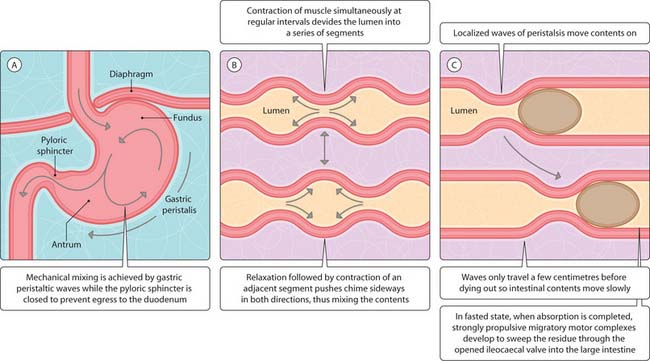19 Gastrointestinal tract
motility and secretions
The efficient movement of digested food, nutrients and waste is dependent upon a balance of absorption and secretion of water and electrolytes by the intestine. The movement of contents within the intestine is caused by the peristaltic action ofthe smooth muscles, which is controlled by the entericnervous system and various hormones and neurotransmitters (Fig. 3.19.1). Any alteration in intestinal motility can give rise to constipation or diarrhoea and is a feature of irritable bowel syndrome and inflammatory bowel disease.
Constipation
Laxatives promoting defecation include:
 bulking agents (e.g. bran, methylcellulose): increase bulk matter within the lumen, thereby stimulating stretch receptors in the intestinal wall and indirectly stimulating muscle contractility
bulking agents (e.g. bran, methylcellulose): increase bulk matter within the lumen, thereby stimulating stretch receptors in the intestinal wall and indirectly stimulating muscle contractility water-retaining agents: saline (e.g. Epsom salts) and osmotic agents (lactulose) are poorly absorbed from the gastrointestinal tract and lead to retention of water within the lumen by osmosis, thereby facilitating bulk mass and transit
water-retaining agents: saline (e.g. Epsom salts) and osmotic agents (lactulose) are poorly absorbed from the gastrointestinal tract and lead to retention of water within the lumen by osmosis, thereby facilitating bulk mass and transit stimulant (irritant) laxatives (e.g. Senna, bisacodyl, phenolphthalein): promote water and electrolyte accumulation in the colon and stimulate muscle motility by stimulating the enteric nervous system
stimulant (irritant) laxatives (e.g. Senna, bisacodyl, phenolphthalein): promote water and electrolyte accumulation in the colon and stimulate muscle motility by stimulating the enteric nervous system faecal softeners (e.g. docusate) or lubricants(e.g. liquid paraffin): improve transit of contents within the colon (Fig. 3.19.1).
faecal softeners (e.g. docusate) or lubricants(e.g. liquid paraffin): improve transit of contents within the colon (Fig. 3.19.1).Prokinetic (motility-promoting) drugs
Agents that increase muscle motility of the gastrointestinal tract (prokinetic) but without laxative actions are used in a number of motility disorders, including gastrointestinal reflux and gastric stasis, where increased gastric emptying is desirable. Domperidone and metoclopromide are dopamine D2 antagonists used in the treatment of nausea and emesis (Ch. 20). Domperidone also increases gastric motility by a poorly defined mechanism and metoclopromide possibly acts on serotonin 5HT4 receptors on gastrointestinal intrinsic neurons to increase acetylcholine release, thereby increasing motility and gastric emptying. Cisapride also stimulates acetylcholine release from intrinsic neurons in the myenteric plexus via a 5HT4 receptor-dependent mechanism, thereby promoting gastric motility. Domperidone does not cross the blood–brain barrier and so is preferable to metoclopromide.
Stay updated, free articles. Join our Telegram channel

Full access? Get Clinical Tree





